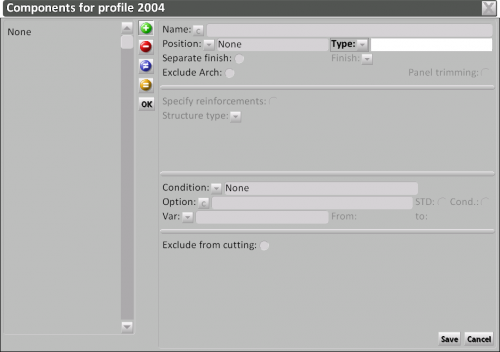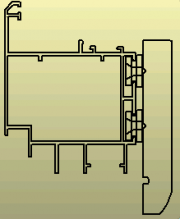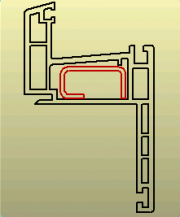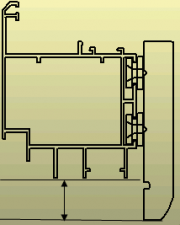Assembled profile components
From Opera Wiki
Revision as of 12:45, 17 May 2011 by Fabrizio.Loddo (Talk | contribs)
Questo riquadro è utilizzato per effettuare delle aggiunte o delle variazioni di un dato profilo selezionato. Di seguito la descrizione dei campi principali:
- Name
 : the name of the component profile.
: the name of the component profile.
- Position
 : the position that the component profile has on the assembled profile. It is used to assign the colours.
: the position that the component profile has on the assembled profile. It is used to assign the colours.
- None: the profile will be considered as raw, therefore the cost calculation will be based on the raw price (usually used for reinforcements inside the profile or for the thermic cut bars in PVC).
- Interior : and the cost calculation will be based on the price of the internal colours of the typology (usually used for wood component or the internal component of the thermic cut).
- Exterior: the cost calculation will be based on the price of the external colours of the typology (usually used for the aluminium component in the aluminium-wood profiles or the external component of the thermic cut).
- Int.-Ext.: the cost calculation will also consider the possible bicolour set out on the typology in the order (typical of the profile in PVC).
|
|
- Type
 the function of the component within the assembled profile. This box is used mostly by users who use Opera Machining, when is necessary to carry out the operation only in the profile whom coincide with the parameters established in this box.
the function of the component within the assembled profile. This box is used mostly by users who use Opera Machining, when is necessary to carry out the operation only in the profile whom coincide with the parameters established in this box.
- Separate finish: if enabled, Opera will consider the color finish type of the external color when using the component.
- Finish : the finish type to which the colors are associated in order to activate the component separation.
- Exclude arch: if enabled, the component will be excluded if the profile is arched
- Specify reinforcements: if enabled, allow the user to specify which side of the window the reinforcement has to be settled. This function is very useful when the reinforcement has to be placed only in one or a few sides of the window..
- Structure type
 : the structure type on which the previous function has to work.
: the structure type on which the previous function has to work.
- Condition: the conditions for entering a component, as it may only be necessary to apply a component under certain conditions. If Interval is set, the program will activate the boxes for setting the variables, and the values relating to entering parameters
- Opzione File:Codice.png
- Il pulsante apre il collegamento con la selezione delle opzioni. Questa casella è abbinata alle caselle Standard e Condizione e determinano il tipo di inserimento del componente nella struttura. A questo riguardo si consiglia di prendere visione del paragrafo dedicato alle Tabelle Opzioni Tipologia, più aventi in questa sezione.
- Standard
- Attivando questo campo il programma considera come scelta standard l’opzione di caricamento del componente. Funzione utile nel caso in cui vi siamo diversi componenti da caricare in funzione del tipo di opzione.
- Condiz.
- Se questa casella è attiva, il programma non richiederà l'opzione nei dati della Tipologia e la utilizza solo come condizione, in automatico.
- Escludi taglio
- Indica al programma che il componente deve essere escluso dalla distinta di taglio.
- Taglia composto
- Indica al programma che il componente dovrà essere considerato nella stessa lista di taglio del profilo composto.
Un caso in cui si può usare Taglia composto è quando il componente deve essere tagliato insieme al profilo composto.
- Differenza taglio
- È il valore che viene sottratto alla quota di taglio del profilo composto per ottenere la quota di taglio del componente, solo se il profilo composto è tagliato a 45°. Il valore deve essere di segno negativo (es.: –25). (vedi immagine a lato)
- Differenza fissa
- È il valore che viene aggiunto alla quota di taglio del profilo composto per ottenere la quota di taglio del componente.
Si può usare questo valore per calcolare la quota di taglio del rinforzo in acciaio di un profilo in PVC, il quale di solito deve essere tagliato più corto. Inserendo il valore –150 il rinforzo in acciaio verrà tagliato 150mm più corto del profilo in PVC.
- Angolo sinistro e Angolo destro
- È il valore che viene usato per determinare gli angoli di taglio del profilo componente quando sono diversi da quelli del profilo composto. Il valore predefinito è Auto e imposta i tagli del componente uguali a quelli del profilo composto.
- Formula
- In questa casella inserisco la formula per il calcolo della quota dei taglio, quando i dati del profilo sono diversi rispetto a quelli in archivio e ho la necessità di effetuare i calcoli per ottenere la giusta distinta di taglio.





